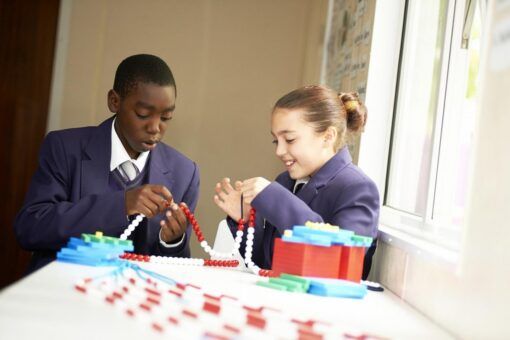
Mathematics Mastery, which was recently featured on Newsnight, combines some of the world’s best teaching techniques to give pupils great foundations in maths. It was developed in collaboration with maths leaders in ARK primaries and secondaries and is now used in over 100 schools across the country. As the team works with even more schools, they are looking for new recruits to share Maths Mastery ideas and inspire pupils.
Building strong foundations
Alexi Makris is one of Mathematics Mastery’s School Development Leads. As a mathematics teacher, he felt there must be a better way of teaching his subject. “I loved teaching maths, but the pressures of the curriculum meant that there wasn’t time to explore the richness of the subject,” he says. “How do you slow down but keep things pacey? How do you take your time, but keep stretching all your pupils?”
He found answers in Mathematics Mastery, an approach that draws on evidence from top-performing countries like Singapore as well as good practice in the UK and within the ARK network. It was developed to support ARK Schools’ vision that every child should enjoy and succeed in mathematics.
Now part of the Mathematics Mastery team, Alexi helps schools put the ideas into practice. “First, we make sure pupils have a deep understanding of a certain idea before we move on to the next.
“The national curriculum divides maths into topic areas: number, algebra, statistics and probability, and space, shape and measure. Many schools move from one area to another, covering them as a range of separate topics, but we recognise that they are interconnected and gradually build on them in a cumulative way.”
Sharing new ways of thinking
Also crucial is the emphasis on concrete, pictorial and abstract concepts. “As well as the usual abstract maths problems, we want pupils to think about maths in terms of concrete materials such as Dienes, bead strings, bars and blocks and images. It means they can see how maths works in the real world.”
Mathematics Mastery also focuses on problem-solving. “We build relational understanding, not just procedural understanding. In other words, we encourage students to come up with their own strategies to find answers, not just practice answering certain questions in a certain way. It helps them to think independently.”
The final key principle concerns language. “It’s vital that teachers and pupils use mathematical language. It makes it easier to see whether everyone understands and helps students with a framework for their thinking. We create resources with key language for teachers for them to adapt – they find it really useful.”
Joining the team
Now the Mathematics Mastery team wants to reach more schools in London and around the country. For those interested in working with the team, Alexi told us what a day in the life of a Mathematics Mastery team member might look like.
“In the morning, I might visit a school and meet the head, to see how things are going. Then I might observe the school’s Maths Lead, to see how Mathematics Mastery is working. I look out for those key principles: are teachers and pupils using the right language, are they using a mixture of concrete, pictorial and abstract? Are teachers encouraging pupils to spot patterns? Then I talk to teachers about what’s working well and how they can support their team to use these ideas and ultimately deepen mathematical understanding.
“In the afternoon, I might be in the office responding to emails, organising and prepping for my next visits, or I might be updating our toolkit, working on lesson plans or videos.
Developing teachers
“Ultimately, this programme is about developing teachers. I now watch teachers who deliver maths lessons better than I could and that’s a real privilege. You need to enjoy working with people and building a rapport with them as they progress. You need to really believe in the approach and in the idea that every single child can master the ideas. And yes – you’ve got to love maths.”
If you’re interested in being a part of the Mathematics Mastery team, call them on 020 3116 0793 or email info@mathematicsmastery.org.